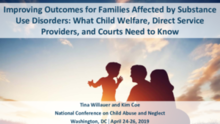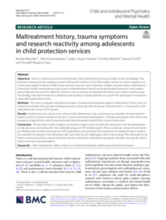Displaying 141 - 150 of 525
This presentation was given at the National Conference on Child Abuse and Neglect in Washington, DC in April 2019. The presentation outlines data on the prevalence of parental substance abuse as a contributing factor for child removal in the US and highlights practices that work for families with substance abuse disorders.
This paper presents a therapeutic model of practice that incorporates Aboriginal concepts of healing and spirit within a creative therapeutic framework.
This article describes current applications of Trauma-Focused Cognitive Behavioral Therapy (TF-CBT) for Childhood Traumatic Separation.
The aim of this study was to investigate the role of self-esteem as a mediator in the association between different types of child maltreatment (i.e., physical abuse, physical neglect, emotional abuse) and depressive symptomatology among a sample of adolescents in out-of-home care.
This article investigates whether individuals who were orphaned as a child suffer long‐term consequences on their pro‐sociality.
This study aims to analyze the comparative effectiveness of Youth Self-Report (YSR) and the Strengths and Difficulties Questionnaire (SDQ) as screening tools of psychological (mal)adjustment, looking for differences in the way psychological problems and difficulties are identified by these two measures in adolescents in residential care (RC).
This article presents a preliminary exploration of the participation in a mindfulness-based group therapy by nine looked after children aged 14 to 17.
This paper draws on an evaluation of the effectiveness of the Nurturing Attachments groupwork programme provided by AdoptionPlus for adoptive families in England. The Nurturing Attachments programme, informed by Dyadic Developmental Psychotherapy (Hughes, Golding & Hudson, 2015), was developed to help foster and adoptive parents strengthen their relationships with the child and support children who had experienced developmental traumas.
This open access study compared self-reported impact of research participation against maltreatment history and current post-traumatic stress symptomatology among a randomly selected group of adolescents (< 18 years old) in the child protection service (CPS) system.
This study examined the effectiveness of solution-focused brief therapy (SFBT) on child well-being and family functioning outcomes for child welfare involved parents.


